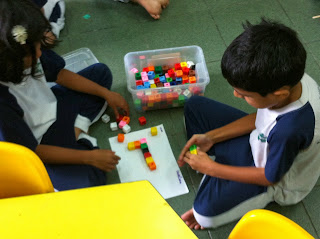A Head Start to a Mathematical Journey ...
Dear parents,
I am pleased to share with you of my
latest reading on Numeracy, based on the first two chapters of ‘Elementary and
Middle School Mathematics: Teaching Developmentally’ (8th ed.) by
Van De Walle Karp Bay – Williams.
Everyone is capable of teaching and
delivering Mathematics even when the subject is said to be a challenging
one. However, according to the authors, ‘there are two essential components towards
becoming an effective teacher of Mathematics and they are our knowledge of
Mathematics and how students learn Mathematics’. No doubt, as teachers (and adults who guide
our young children or students) we tend to be rigid with our way of teaching
Mathematics with the presence of and reference to structured resources and curriculum. Giving our young children a head start in
Mathematics is equally important as facilitating them with the recommended
techniques suited to their level of readiness; simple to complex and concrete
to abstract. We know our children learn
best through hands-on experiences and the more they manipulate items with their
senses, the more able they will be in attempting problem solving.
There are many different ways of solving
Mathematical problems and these are all dependent on the way we ourselves
learnt Mathematics in our younger days. Teachers
can play their part in facilitating the children to acquire the skill of Mathematics
by crafting from prior knowledge, providing opportunities to talk about the
subject, reflective thinking, encouraging multiple approaches and many more. When it comes to understanding Mathematical
concepts and ideas, children can make use of various modes to represent their
thinking and demonstrating their capabilities in acquiring it. These can be in the form of, as mentioned
earlier, the use of concrete and hands-on materials such as manipulative,
counters, everyday items (like bread tags) and others; ranging to pictorial
cards and written symbols.
Children need
to be encouraged and facilitated in an open ended channel so that they would be
able to source for alternative strategy or solution to crack the Mathematical problems
or concepts that they are working on. They are, after all, constructors of
knowledge.
It is no mean feat to get our children
to gain proficiency in Mathematics. With
that, I do agree with the authors of this book, “To respond to students’ challenges, uncertainties, and frustrations
you may need to unlearn and relearn mathematical concepts, developing
comprehensive understanding and substantial representations along the way.”
Signing off till another note,
Miss Khadijah Senan




No comments:
Post a Comment